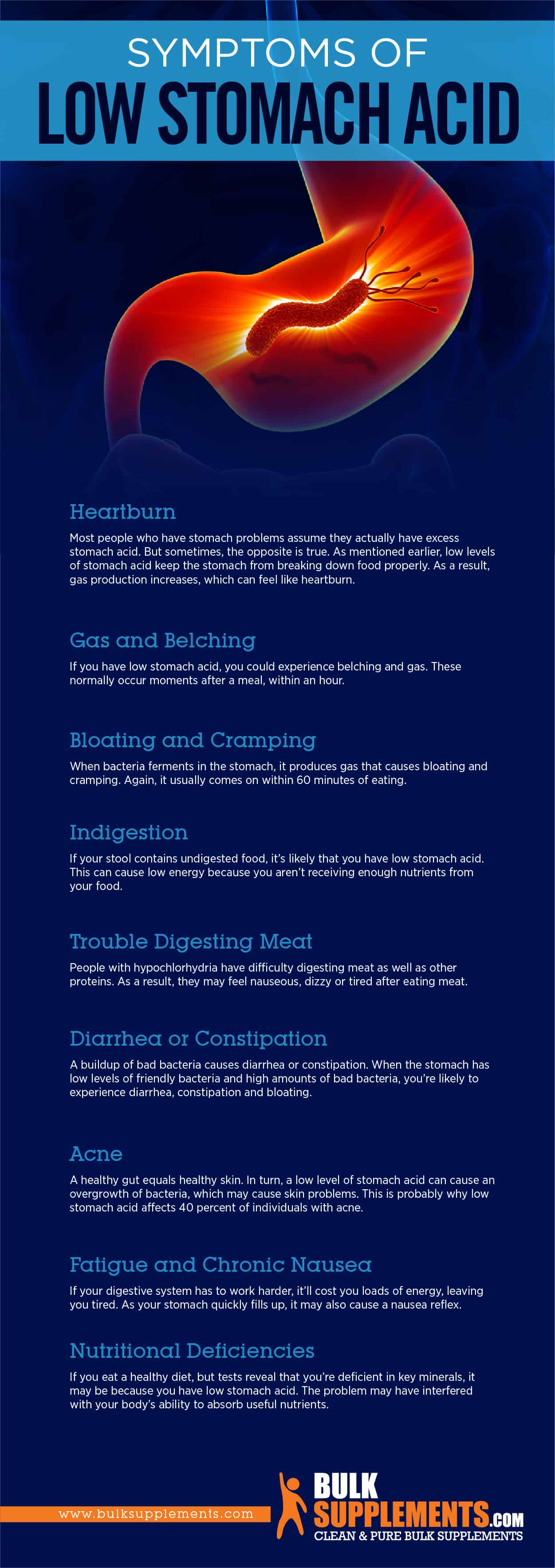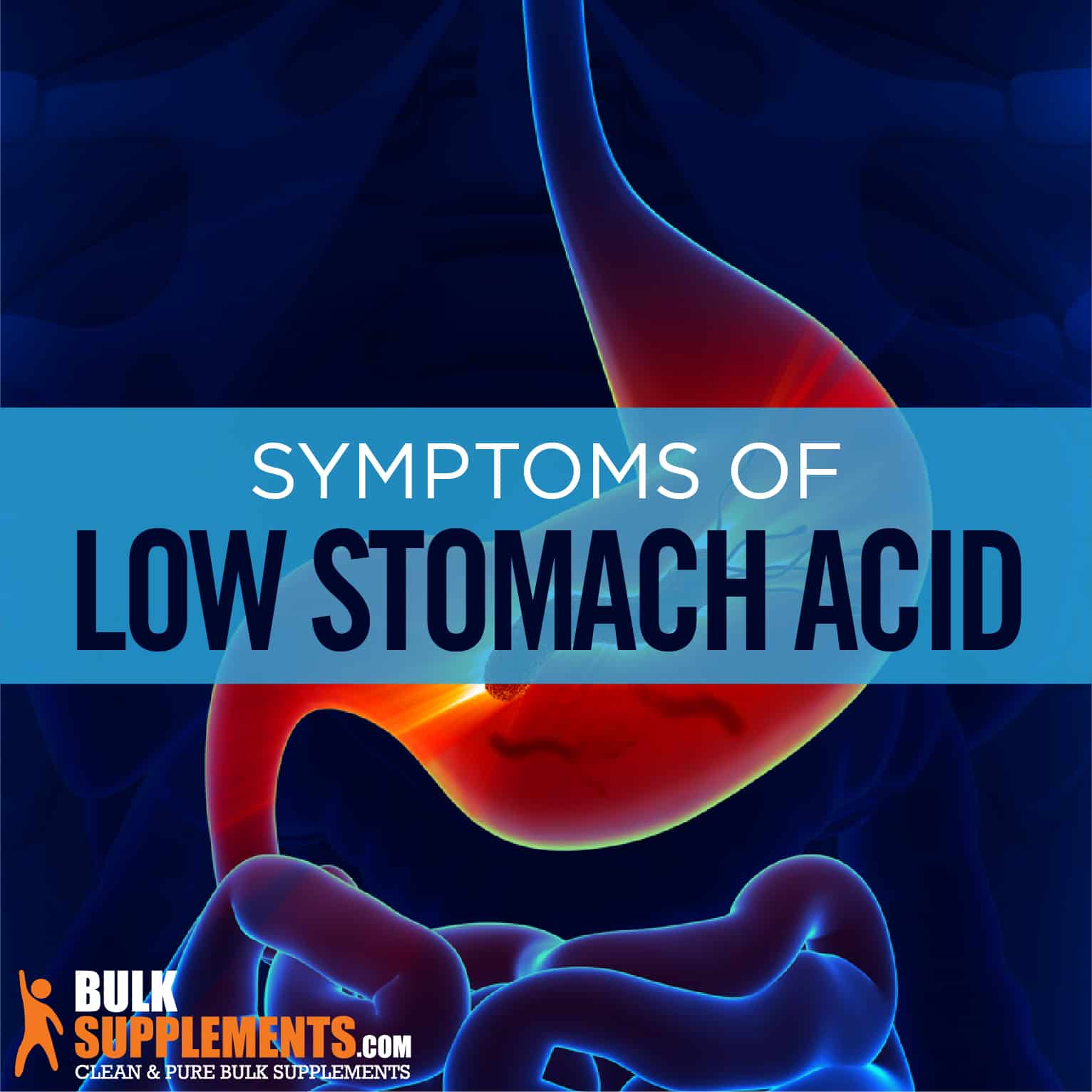What is Low Stomach Acid?
The medical name for low stomach acid is hypochlorhydria (x). A low amount of stomach acid may cause a person to experience nutritional deficiencies, gastrointestinal infections and digestive issues. A person with low stomach acid also can’t produce hydrochloric acid in the stomach. However, treating the condition as soon as possible may prevent severe complications.
Together with certain enzymes, stomach acid helps to break down food. It also helps the body absorb nutrients (like vitamin B12 and protein) while killing bacteria and other stomach pathogens to prevent infection.
Low Stomach Acid Symptoms
Hypochlorhydria triggers poor digestive activity. Since food and nutrients can’t be broken down by the stomach, they stay in the stomach and may lead to bacteria build-up. This process then causes common low stomach acid symptoms like heartburn, indigestion and bloating (x).
Heartburn
Most people who have stomach problems assume they actually have excess stomach acid. But sometimes, the opposite is true. As mentioned earlier, low levels of stomach acid keep the stomach from breaking down food properly. As a result, gas production increases, which can feel like heartburn.
Gas and Belching
If you have low stomach acid, you could experience belching and gas. These normally occur moments after a meal, within an hour.
Bloating and Cramping
When bacteria ferments in the stomach, it produces gas that causes bloating and cramping. Again, it usually comes on within 60 minutes of eating.
Indigestion
If your stool contains undigested food, it’s likely that you have low stomach acid. This can cause low energy because you aren’t receiving enough nutrients from your food.
Trouble Digesting Meat
People with hypochlorhydria have difficulty digesting meat as well as other proteins. As a result, they may feel nauseous, dizzy or tired after eating meat.
Diarrhea or Constipation
A buildup of bad bacteria causes diarrhea or constipation. When the stomach has low levels of friendly bacteria and high amounts of bad bacteria, you’re likely to experience diarrhea, constipation and bloating.
Acne
A healthy gut equals healthy skin. In turn, a low level of stomach acid can cause an overgrowth of bacteria, which may cause skin problems. This is probably why low stomach acid affects 40 percent of individuals with acne (x).
Fatigue and Chronic Nausea
If your digestive system has to work harder, it’ll cost you loads of energy, leaving you tired. As your stomach quickly fills up, it may also cause a nausea reflex.
Nutritional Deficiencies
If you eat a healthy diet, but tests reveal that you’re deficient in key minerals, it may be because you have low stomach acid. The problem may have interfered with your body’s ability to absorb useful nutrients.
Leaky Gut Syndrome
You are far more likely to suffer leaky gut syndrome if you have low stomach acid levels, as your body will begin collecting harmful bacteria and toxins (x).

Causes of Low Stomach Acid
What causes low stomach acid? A number of things may be behind it.
Aging
As you age, all physical systems begin to slow down — especially the digestive system (x). This is particularly the case if you’re stressing out your body more than it can handle.
If you’re over 50, consider taking supplemental stomach acid as it can help minimize the effects of aging on the digestive system.
H Pylori
H Pylori is a normal part of your microbiome. But poor diet, chronic stress, overuse of antibiotics, etc. can cause a change in your microbiome, excess growth of H Pylori and a reduction of stomach acid.
As H Pylori grows excessively, it produces an enzyme known as “urease,” which breaks down urea in the stomach into ammonia and carbon dioxide. This then causes bad breath (halitosis) and burping and neutralizes the effects of stomach acid. This leads to further H Pylori growth and additional stress on the gastrointestinal system (x).
Stress
Anything that causes stress (poor diet, bad posture, overuse of medications, anxiety) may cause low stomach acid. Eating while stressed can be particularly problematic, as it may lead to digestive distress and bloating. Stress can also decrease stomach acid production (x).
Medications
Long-term intake of antacids or medications for heartburn or acid re-flux may reduce the production of hydrochloric acid in the body. Moreover, doctors often prescribe proton pump inhibitors for acid re-flux, and they may cause low stomach acid (x).
Stomach Surgery
Stomach surgeries, including gastric bypass surgery, may reduce stomach acid production (x).
Vitamin Deficiency
Deficiency of B vitamins or zinc may also cause hypochlorhydria. These deficiencies could be due to inadequate dietary intake, alcohol consumption or smoking (x).
Low Stomach Acid Remedies and Supplements
The stomach is naturally acidic. Because of this, the effects of hypochlorhydria compromises the whole digestive system. When your digestive tract is unable to break down foods effectively, your body can’t absorb essential vitamins and minerals. Thankfully, however, there are various ways to help normalize your stomach’s acidity level.
Eat Ginger
Ginger is renowned for its anti-inflammatory qualities, which are crucial for decreasing inflammation from hypochlorhydria (x). It’s also been shown to help treat acid reflux as well as other digestive system disorders. But more research is required to prove its effects on regularizing stomach acid.
You can grate, steep or slice ginger into foods and tea. It also comes as a powder and an oral supplement. Consult with your physician before adding ginger to your diet.
Stress Management
Decreasing stress can help restore digestive function. Here are lifestyle changes that might help:
- Exercising regularly
- Controlling and decreasing sources of stress
- Practicing meditation
- Learning progressive muscle relaxation and deep breathing techniques
- Practicing yoga
- Attending therapy
Address Nutrition Deficiencies
For your stomach to make hydrochloric acid, your body must absorb zinc from your diet. Here are examples of zinc-rich foods (x):
- Cashews
- Baked beans
- Fortified breakfast cereals
- Oysters and crabs
- Pumpkin seeds
- Beef and pork
Low stomach acid may also cause other deficiencies like a lack of vitamin B12, calcium and iron. Your dietitian or doctor may recommend increasing your dietary consumption of the nutrients or taking supplements, especially once you regain a normal stomach acid level.
Change Eating Habits
Making certain changes in your diet may help improve symptoms of low stomach acid:
First, steer clear of foods that are hard to digest like fatty or fried food. Also, chew food thoroughly to break it down and let it mix with digestive enzymes in your mouth. Smaller particles are digested more easily in the stomach. Further, avoid eating anything at least three hours before you go to bed. This lets your body fully digest food before you sleep and can decrease the chances of nighttime heartburn. And, of course, don’t eat while lying down.
Take Hydrochloric Acid Supplements
Short-term use of hydrochloric acid supplements and pepsin can be a helpful step in treating low stomach acid. This may also help eliminate food allergies, reduce acid reflux and heal leaky gut.
Take the supplements with meals and avoid them if you’ve got ulcers. Follow the instructions on the product’s package and don’t take supplements for digestive health without your doctor’s supervision.
Take Apple Cider Vinegar or Digestive Enzymes
If you aren’t producing adequate stomach acid, the pancreas isn’t being signaled that you need digestive enzymes.
Fortunately, you can take digestive enzyme supplements until your digestive juices are working normally. Make sure to buy an enzyme supplement that contains amylases, lipases and proteases, which break down carbohydrates, fats and proteins.
Herbal bitters or apple cider vinegar are also good digestive enzymes if used before meals.
Consume Less Animal Protein
Some incorrectly assume that animal foods are easier to digest than plant-based ones. However, the opposite is indeed true. Animal proteins require high levels of stomach acid to be digested.
Thankfully, there are many great plant protein sources, including (x):
- Seeds (chia, pumpkin seeds, flaxseeds, hemp seeds, sunflower seeds, sesame seeds and quinoa)
- Nuts (choose unsalted, raw almonds, cashews, Brazil nuts, pecans, pistachios, macadamia nuts and walnuts)
- Legumes (black beans, kidney beans, pinto beans, navy beans, chickpeas, Romano beans, etc.)
- Avocado
- Coconut
- Plant-based alternatives to cheese and milk
Eat Fermented Vegetables
Fermented vegetables like pickles, kimchi and sauerkraut can naturally increase your stomach acid levels. Fermented foods and vegetables provide probiotic effects that may improve digestion, reduce inflammation and fight harmful bacteria caused by hypochlorhydria (x).
Apart from improving digestion, fermented veggies have been linked to promoting weight loss, lowering blood pressure and strengthening immune function. Before adding fermented foods to your diet, make sure to discuss the benefits and risks with your doctor.
Take Manuka Honey
This curative honey, which comes from New Zealand, was shown in studies to possess antibacterial properties against H Pylori (x). This helps because keeping bacteria and other pathogens in check while treating hypochlorhydria and other digestive issues are vital to ensuring speedy healing and preventing other health disorders.
Just ensure you’re getting genuine Manuka honey from New Zealand. Only 2,000-3000 tons are made every year (x).
Review Medication Use
Americans spend over $13 billion every year on antacids — reducing their low stomach levels even further (x). For this reason, it’s vitally important to test your levels of stomach acid.
Long-term use of proton pump inhibitors and antacids can result in low stomach acid. Your doctor may recommend switching to another treatment or stopping the use of these drugs. But remember, always speak with your doctor before stopping or switching medications.
The Bottom Line
Stomach acid is crucial for proper digestion. Low levels stop the stomach from soaking up essential vitamins and nutrients. Low stomach acid leaves the body susceptible to infection as well.
If left untreated, low stomach acid can negatively impact your overall health and well-being. It’s vital to report symptoms and have an examination.
While treating low stomach acid depends on the root cause, improving your diet and making lifestyle changes can help you improve your stomach acid levels. Other treatment options include taking supplements for stomach health.
Before trying any alternative treatment, consult with your doctor about your options. The problem may need a more traditional approach. Once your doctor determines the cause of your low stomach acid, they may recommend ways to alleviate or prevent symptoms. Timely treatment also lowers the chances of complications.


